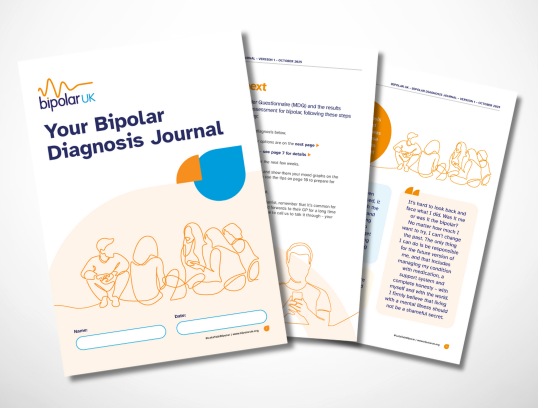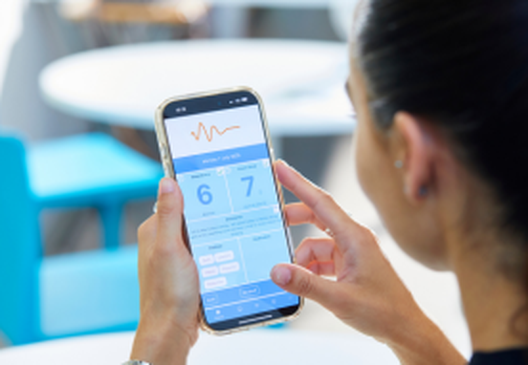
Diagnosing bipolar
There are many symptoms of bipolar that can often be overlooked for something else. If you think you may have bipolar, here are the steps you can take to help doctors rule in or out whether you have a diagnosis.
Maybe it’s bipolar?
If you have:
- Been through periods when you’ve been highly energised, productive or restless for days or weeks at a time, followed by periods of low mood, little energy and no interest in things you usually enjoy
- Had times when you had very little sleep, have taken more risks and/or made impulsive decisions
- Tried different types and doses of antidepressants that don’t seem to help much, if at all
It’s worth asking the question... maybe it’s bipolar?
Get your bipolar diagnosis journal
Take the bipolar test
Our bipolar test, also known as the Mood Disorder Questionnaire (MDQ) can give you an idea of whether or not you may have bipolar, and some helpful information to take to your GP.
After taking this questionnaire, you can also get our free, interactive journal delivered to your inbox to help you on your diagnosis journey.

Why bipolar diagnosis matters
We understand that even thinking about being diagnosed with bipolar may feel overwhelming. But the reality of getting diagnosed may be more positive than you might expect. Here are some of the reasons why getting a diagnosis can be positive:
You can start treatment
You can only get specialist medicines and access to support services once you have a diagnosis of bipolar.
A self-management programme is another important part of treatment. This includes steps to manage bipolar through ‘protective factors’, such as having a regular sleep pattern and exercising regularly.
A diagnosis can help explain past experiences
Like lots of people with bipolar, you may have shame and regret about things you’ve said or done when you’ve been going through a period of mania or deep depression. You may not understand why you behaved this way, which can feel lonely and confusing.
Having a diagnosis can help you make sense of things.
Having a diagnosis can mean other people understand you better
During episodes you may behave in ways that are challenging for your friends, relatives and colleagues. This can put a strain on your relationships.
Nearly half of people with bipolar say having a diagnosis helps others understand them.
You may find it easier to get the right support
Once you have a diagnosis you can link up with other people who will understand what you’re going through using our free peer support services.
of people living with bipolar say getting a diagnosis has been either helpful or very helpful
of people with bipolar say that ‘explaining past experiences’ is the top benefit of getting a diagnosis
of people with bipolar say that getting a diagnosis helped them get better medication
Preparing for appointments
Your GP will ask you lots of questions about your mood, thoughts, behaviour and family history. If they think it’s appropriate, they will refer you to a psychiatrist who will take the time to understand what’s going on for you.
Preparing for these appointments may give you a better chance of being diagnosed quicker if you do have bipolar - and of ruling it out if you don’t.
6 ways to make the most of an appointment
1. Monitor your moods and behaviour
Using our Mood Tracker app to record your daily mood, sleep and emotions before your appointment means you can show your doctor weekly and monthly snapshots of what symptoms you've been having.
2. Explain the problems your moods are causing
You only meet what's called the 'diagnostic criteria' for bipolar if it causes you considerable problems. Think about your experiences and explain to your GP how you feel it impacts how you function - for example, in terms of your work, chores, social life, and relationships with family, friends and colleagues.
3. Ask your friends and family
If you feel comfortable, ask the people closest to you if they’ve noticed any patterns or behaviour they think might be helpful to mention to your GP or psychiatrist.
4. Think about your family history
Bipolar is a partly genetic condition, which means it can sometimes be passed down through families. If there are other people living with bipolar in your family, this is useful information that can help with diagnosis. Remember that it used to be called ‘manic depression’. Or you may know of family members who were considered to have unusual behaviour at times, or highs and lows. These could be clues. Don’t worry if you’re not able to gather information on family history – it can help doctors to build a fuller picture, but isn’t essential.
5. Take someone with you
You may want to ask someone to go with you to your appointments. They can prompt you to ask questions, write notes to help you remember what was said afterwards and offer moral support. But if you’d prefer to go on your own, that’s fine too.
6. Ask if you don’t understand something
GPs and psychiatrists sometimes use clinical language that can be confusing. You can ask them to go over something again if you haven’t understood, or you can repeat what you think they said to check you’ve got it right. Most doctors will be happy to go over things.
After your bipolar diagnosis
It’s normal to have a range of different feelings when you’re diagnosed with bipolar. For some people, being diagnosed can be a real shock.
You may have heard negative stories about famous people with bipolar or know people in your own family who live with the condition. This may lead to concerns you’re going to be like them. It’s natural to worry about how it might affect the rest of your life.
Many people living with bipolar tell us that a diagnosis of bipolar can lead to a kind of grieving for a future they thought they’d have. It’s common to dislike the idea of having a ‘label’.
Other people tell us that having a diagnosis is a relief, especially if they’ve been living with undiagnosed symptoms for a long time. Having a diagnosis means you can finally get the right treatment. It can help you make sense of your life and can give you some hope for the future.
You may feel a mixture of different emotions in the days and weeks after your diagnosis. It’s all completely natural and many people with bipolar tell us they’ve been through many different stages.
Your feedback matters
We want to understand the impact of our activities and what we can do better.
If you are on a diagnosis journey, or a loved one supporting someone on that journey, please help us improve our services and resources.





